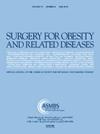减肥手术患者术前抗凝治疗:2015-2021 年 MBSAQIP 数据库研究。
IF 3.5
3区 医学
Q1 SURGERY
引用次数: 0
摘要
背景:肥胖与不良心血管事件之间的联系已得到证实。随着代谢和减肥手术(MBS)发病率的上升,越来越多接受袖带胃切除术(SG)或RYGB(Roux-en-Y 胃旁路术)的患者可能会在术前进行治疗性抗凝(AC):本研究评估了术前接受抗凝治疗的 SG 和 RYGB 患者的围手术期结果:方法:接受初级 SG 和 RYGB 手术的成人:对2015-2021年MBSAQIP数据库中接受初治SG或RYGB术前抗凝和未接受术前抗凝(分别为SG-AC或RYGB-AC和非SG-AC或非RYGB-AC)的成人进行分析。使用熵平衡权重调整了每个 MBS 的 AC 状态的基线特征差异。采用多变量逻辑和线性回归分析 AC 与相关结果之间的独立关联:在纳入的 1,178,090 例患者中,72.0%(n = 850,682 例)接受了 SG,28.0%(n = 327,408 例)接受了 RYGB,其中分别有 1.8%(n = 15,021 例)和 1.9%(n = 6201 例)的患者接受了 AC。与非 SG-AC 和非 RYGB-AC 相比,SG-AC 和 RYGB-AC 的 30 天吻合口漏、深静脉血栓和消化道出血的绝对发生率均较高。经多变量调整后,SG-AC 发生不良心血管事件、吻合口漏、胃肠道出血的几率明显更高,手术时间和住院时间也更长。RYGB-AC与再入院、意外入住ICU和急诊室就诊的几率更高相关:虽然术前 AC 可能会导致 SG 和 RYGB 的不同结果,但这项为期 7 年的 MBSAQIP 研究表明,术前 AC 与更高的术后发病率总体相关。管理术前 AC 的 MBS 患者需要考虑血栓出血风险。本文章由计算机程序翻译,如有差异,请以英文原文为准。
Bariatric surgery in patients with preoperative therapeutic anticoagulation: a 2015–2021 MBSAQIP database study
Background
The link between obesity and adverse cardiovascular events is well-established. With the rising prevalence of metabolic and bariatric surgery (MBS), a greater number of patients undergoing sleeve gastrectomy (SG) or Roux-en-Y gastric bypass (RYGB) may present with preoperative therapeutic anticoagulation (AC).
Objectives
This study evaluated perioperative outcomes of SG and RYGB in patients on preoperative AC.
Setting
Patients reported to the 2015–2021 Metabolic and Bariatric Surgery Accreditation and Quality Improvement Program (MBSAQIP) database.
Methods
Adults undergoing primary SG or RYGB with and without preoperative anticoagulation (SG-AC or RYGB-AC and non-SG-AC or non-RYGB-AC, respectively) were analyzed from the 2015–2021 MBSAQIP database. Differences in baseline characteristics by AC status for each MBS were adjusted using entropy-balanced weights. Multivariable logistic and linear regressions were developed to analyze the independent association between AC and outcomes of interest.
Results
Of 1,178,090 patients included, 72.0% (n = 850,682) had SG and 28.0% (n = 327,408) had RYGB, of which 1.8% (n = 15,021) and 1.9% (n = 6201) had AC, respectively. Compared to non-SG-AC and non-RYGB-AC, both SG-AC and RYGB-AC encountered higher absolute 30-day rates of anastomotic leak, deep vein thrombosis and gastrointestinal bleeding. Following multivariable adjustment, SG-AC was associated with significantly greater odds of adverse cardiovascular events, anastomotic leak, gastrointestinal bleeding, and greater operative length and length of stay. RYGB-AC was associated with higher odds of readmission, unplanned ICU admission, and ED visit.
Conclusions
While preoperative AC may confer distinct outcomes between SG and RYGB, this 7-year study of MBSAQIP demonstrated an overall association with greater postoperative morbidity. Management of MBS patients with preoperative AC requires consideration of thrombohemorrhagic risks.
求助全文
通过发布文献求助,成功后即可免费获取论文全文。
去求助
来源期刊
CiteScore
6.70
自引率
12.90%
发文量
570
审稿时长
56 days
期刊介绍:
Surgery for Obesity and Related Diseases (SOARD), The Official Journal of the American Society for Metabolic and Bariatric Surgery (ASMBS) and the Brazilian Society for Bariatric Surgery, is an international journal devoted to the publication of peer-reviewed manuscripts of the highest quality with objective data regarding techniques for the treatment of severe obesity. Articles document the effects of surgically induced weight loss on obesity physiological, psychiatric and social co-morbidities.

 求助内容:
求助内容: 应助结果提醒方式:
应助结果提醒方式:


